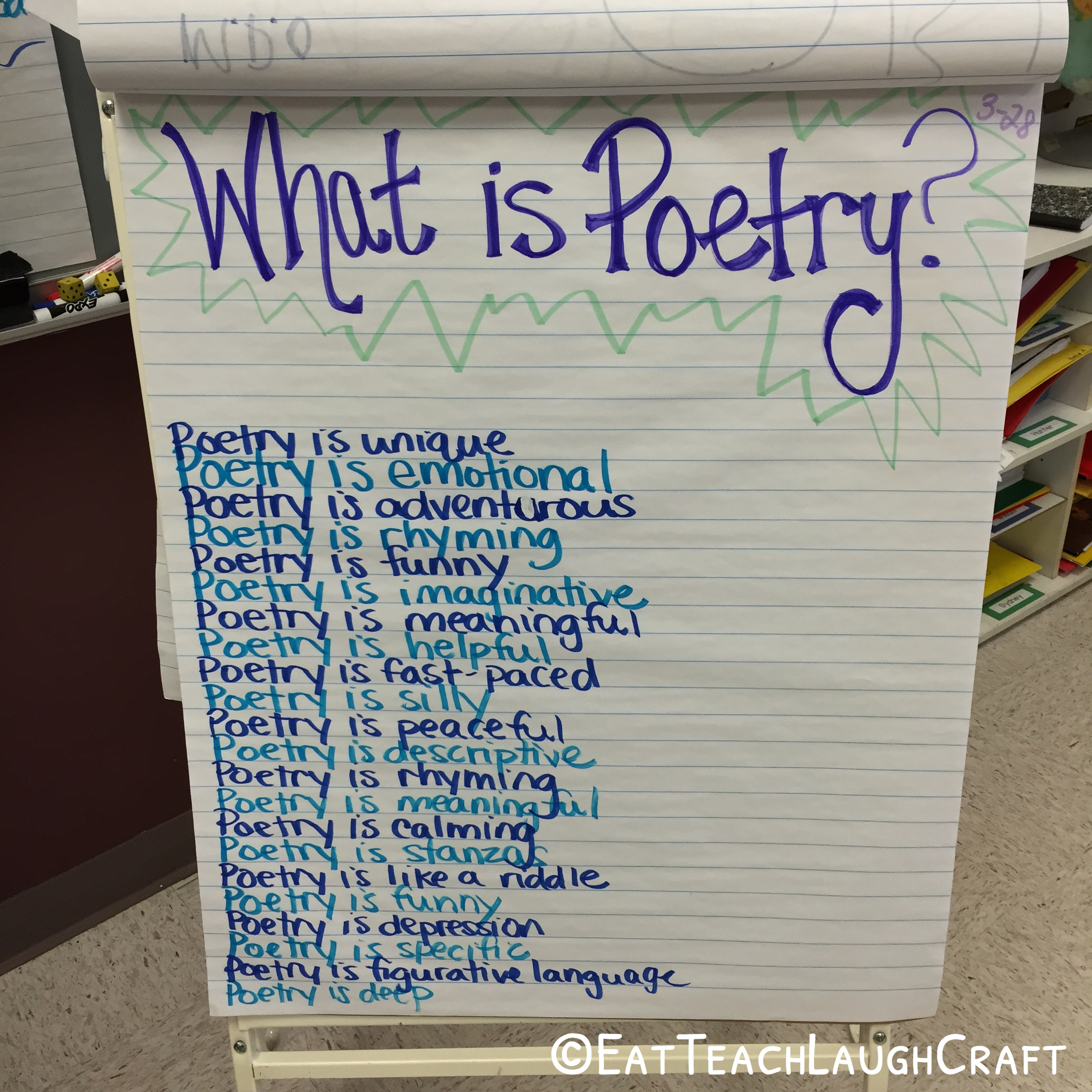We are currently in the middle of our poetry until and so far everyone is having a blast! Every year our students love writing poetry because it’s a totally different type of writing than they have done all year long. In the beginning on the year up until now, we focused on narrative and essay writing. These students have written a TON of stories and essays and have worked so hard. The best way to reward them is to allow them the creative freedom to write about anything they want.
I always start off our poetry units with free verse poetry, allowing the students to “just write” for the sake of writing. So often they are concerned about writing the “right way.” That’s why so many of them enjoy writing poetry because it takes away that fear and allows them to be who they are as writers.
 To begin our unit, I asked the students to jot down what they already know about poetry as a free-write in their notebooks. I expressed that they could jot down any terms they know that relate to poetry, various forms of poems, why people write poems, etc. The possibilities are endless. I gave the class about 5-7 minutes just to jot down their thoughts and write what they know about poetry.
To begin our unit, I asked the students to jot down what they already know about poetry as a free-write in their notebooks. I expressed that they could jot down any terms they know that relate to poetry, various forms of poems, why people write poems, etc. The possibilities are endless. I gave the class about 5-7 minutes just to jot down their thoughts and write what they know about poetry.
After they were done, volunteers shared with the class what they jotted down. It was pretty amazing to see how diverse their views of poetry really were. Some students shared that poetry evokes certain emotions. Other students shared that poetry had to rhyme. Some students wrote down that poems do not have rules. Students also shared various forms of poems they were aware of already, and the list goes on. We discussed their ideas and some misconceptions before moving on to actually examining some poetry.
Then I shared my favorite poem with the class. I read aloud “Sick” by Shel Silverstein. I explained how my sisters and I used to recited this over and over and had every line memorized since I was a kid. There’s something about certain poems that just stick to you. I loved how witty this poem was along with the rhythm and flow.
Once I read aloud the poem, I asked students to add to their knowledge of poetry based on what they just read. A few students shared that the poem rhymed, had rhythm, repetition, alliteration, etc. Just by looking at one poem together, we were able to have a huge conversation about what makes a piece of writing poetry.
Now it was their turn to find poems that they love!
 I think that it’s extremely important that before students do any kind of writing in a particular genre, they are exposed to a variety of examples that fit that type of writing. Therefore, my coteacher and I created a “poetry booklet” for each student. Each book contained about 50-75 poems of various forms and styles printed or photocopied from different resources. We included poems humorous poems from famous poets such as Shel Silverstein and Jack Prelutsky to more serious poems from famous poets such as Robert Frost and Langston Hughes. Hauiks to Limericks. Concrete poems to sonnets. The bigger the variety, the better. That way students gain exposure to the many different options, forms, and types of poems that exist. We asked the students to read through some of the poems and make note of ones that stood out to them in some way.
I think that it’s extremely important that before students do any kind of writing in a particular genre, they are exposed to a variety of examples that fit that type of writing. Therefore, my coteacher and I created a “poetry booklet” for each student. Each book contained about 50-75 poems of various forms and styles printed or photocopied from different resources. We included poems humorous poems from famous poets such as Shel Silverstein and Jack Prelutsky to more serious poems from famous poets such as Robert Frost and Langston Hughes. Hauiks to Limericks. Concrete poems to sonnets. The bigger the variety, the better. That way students gain exposure to the many different options, forms, and types of poems that exist. We asked the students to read through some of the poems and make note of ones that stood out to them in some way.
After spending about 20 minutes exploring the poetry books with their reading partners, the students made their way back to the carpet and added to their free write from the beginning of class about what they knew about poetry. I provided them with the thinking stem, “What I now know about poetry is…” The students wrote for about 5 minutes and we once again shared and commented.
To end our introductory poetry lesson, I wrote, “Poetry is ________.” on the board and asked the students to brainstorm one word or phrase that can be used to fill in the blank. I reminded them that it was ok if their word or phrase was the same as someone else. We went around the room and each student (and teacher) shared their words/phrases to form a beautiful poem that we read once we were done. The students were so shocked when they realized that as a class they had created a poem! They thought it was so cool :)
It was a great first poetry lesson! Check back for future posts about how the rest of our poetry unit turned out :)


